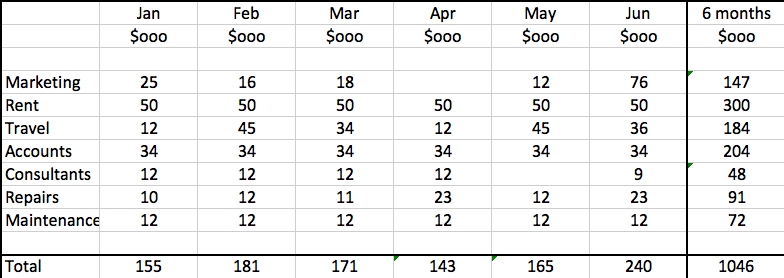GE is trying to reinvent the employee review. Accenture and Adobe have scrapped annual reviews. But here’s the thing. This challenge of monitoring performance, of developing talent still remains, whether we have annual reviews or not. The challenge of improving performance is solved not only by how we mentor, and teach, and give feedback – it’s solved by building error checking into the system. The Checklist Manifesto by Atul Gawande is a fascinating dive into the world of checklists, and how pilots and surgeons (and dozens of other examples) have transformed performance by building self-checking into their world. So how often do we consciously encourage our employees to build self-checking tools into their work. The technology is everywhere to help us with this task.
Here is a very simple example from the world of spreadsheets.
Look at this little table of costs. What’s wrong with it?
Can you see the error made in one of the formulas? Not easily and I’m telling you there’s an error!
Look at the same table with a built in self checking cell.
By inserting a new control total, that sums all totals across the page, 1055, and compares it with the 6 months total of 1046, we see we have an error of 9. The formula used to compute the 6 months total for “consultants” has missed the June number of 9.
Just a simple example that shows how easy it is to trap an error at the point of origin. But this self- checking technique is a discipline. You can teach every employee this way of thinking. Every employee in every department should be conducting self checking routines. It becomes a self perpetuating continual process of improvement. It’s like a mini post-mortem at the end of each mini project. You could be in sales checking commissions, you could be in payroll checking salary control totals, an accountant conducting a bank reconciliation, or a marketing executive ensuring that all campaigns are accounted for and trapped in the ROI report.
The annual review was always a flawed process unless it was in addition to a continual self monitoring procedure, and a continual two-way feedback and mentoring with your boss.
Most employees want to make a difference. They want to master their craft and have the space to enjoy some degree of autonomy. But the secret to a happy company is to ensure employees understand their own performance before their manager gets to it!










